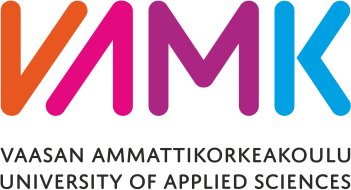
Accessibility in Studies
Accessibility refers to the realization of the physical, mental and social environment so that everyone, regardless of their characteristics, can function on an equal footing with others.
Accessibility affects all students and all staff. It is particularly important for those members of the university community who have a disability who are aging or belong to cultural or linguistic minorities. Accessibility work is based on the Equality Act.
Accessibility work has a multifaceted effect on removing barriers to learning. In addition to the usability of the premises, attention is paid to the so-called removing invisible barriers. These include e.g. various specific issues related to learning problems and mental health barriers. Accessible learning is supported by students’ personal guidance.
Accessibility of VAMK’s premises
All Vaasa University of Applied Sciences properties have unobstructed access. The properties are well connected to the rest of the city and parking for the disabled is also in order.
- All parking spaces on the properties have marked disabled spaces. (see map)
- Unobstructed access to the university premises through the main door (see map).
- VAMK has a wheelchair that can be borrowed for visitors, which can be inquired from the janitors if necessary.
- VAMK has several disabled toilets.
- There are several lifts to facilitate mobility
Contact:
Safety and Property Manager Sanna Torkko, sanna.torkko@vamk.fi
Special arrangements for reading and learning difficulties
The special arrangements are intended to support students with dyslexia or other learning difficulties. On the basis of the dyslexia diagnosis or the doctor’s statement, the student may receive additional education or other special arrangements that may be necessary may be made. The special arrangement is usually extra time in the exam. The student must notify the teacher of his / her right to additional time in advance.
A student entitled to special arrangements receives a dyslexia card (LUKI-kortti) from the study instructor, which shows the student’s personal information and which he or she shows, if necessary, for example in a re-examination if special arrangements are needed.
A Opitaan yhdessä (Learning Together) course has been prepared for further education. Learning together course is designed to help the progress of studies in situations where a student or more needs additional practice or guidance to achieve the goals of the course.
The initiative can come from a student or a teacher. Additional supervision is provided by a fellow student (or two) and the compensation for the work is credits for elective studies. Additional supervision will be agreed with the course teacher and he will also record the performance in Peppi on the basis of the report.
Dyslexia card (LUKI)
The LUKI card is issued to a student who has a document of dyslexia or other learning difficulties. To obtain the LUKI card, the student must contact the study supervisor. The student discusses with the teacher the reading and other learning difficulties so that they can be taken into account and special arrangements can be agreed.
Exams and Maturity Test
A student who has difficulty with reading and writing always marks this information to the exam and the answer of the assignment by writing eg ‘dyslexia’. In this way, the teacher can take this into account in the assessment. Typos do not affect the evaluation as long as the core message is transmitted.
Using a computer at an exam
The right to use the computer is marked at the student’s LUKI card
The student notifies the teacher of the special arrangement in advance by e-mail
The student picks up the laptop from the study office before the exam
The teacher picks up the memory stick from the study office and gives it to the student at the test session
The student saves their answer on a memory stick and gives it to the teacher after the exam is over
The teacher prints the exam answers and clears the memory stick and returns it to the study office.
Re-examination
The student registers for the re-examination and notifies the teacher of special arrangements, such as his / her computer access and memory stick, in advance by e-mail.
The teacher puts the memory stick in an exam envelope and marks ‘the LUKI student memory stick’ on top of the envelope.
At the end of the re-examination, the student saves his / her answer on a memory stick and returns it in an envelope with the answer papers.
Extra time at the exam
The student’s LUKI card is marked with an additional time of 20min / 45 min.
The student is always in contact with the teacher before the exam about the extra time so that the teacher can prepare for it.
If necessary, the teacher will contact the study supervisor of his / her unit in good time for additional time supervision arrangements.
Study counselors as a team strive to act as overtime supervisors, as needed.
A student entitled to special arrangements must register for the repetition of only one exam per session. Recurrences last 3x 45 min, so no extra time is needed.
Before the start of studies:
The letter of invitation to the entrance examination informs about the possibility of special arrangements and the candidates are asked to indicate any reading difficulties and any special arrangements required.
At the entrance examination
Possible special arrangements at the entrace exmination:
Giving extra time in the test situation
Arranging a quiet space for the duration of the experiment
Verbal instruction of the task and / or reading the task aloud
At the beginning of studies:
Students are informed about the possibility of special arrangements
If a student or teacher suspects that the student is having reading difficulties, the student is referred through a study supervisor to a dyslexia test, which is paid by the educational institution.
Special arrangements are agreed with the Study Supervisor or Group Supervisor
Students are advised to inform their teachers about the learning difficulties
During the studies:
Additional teching given by another student
Extra time for exams and other similar assignments (20min / 45 min)
Making lecture materials available beforehand
Personalized assignments
The right to use a computer in a test situation (according to the agreement, the student will have access to a laptop without internet connection for the duration of the exam)
Verbal instruction in assignments, also in exams
Verbal examination or supplementation of the examination
Typos do not affect the evaluation as long as the content comes across
Where possible, a separate quiet area in exam situations to reduce anxiety
Learning-to-learn course, where you learn to identify your own learning style and practice your learning skills (temporarily unavailable)
Extended loan periods in the library
During the trainee period:
Consult with the internship supervisor about special arrangements related to the internship
If the student wishes, learning difficulties can be reported to the traineeship employer
Students are encouraged to discuss about difficulties themselves.
While working with the thesis
If necessary, additional guidance is provided for writing the thesis
The dyslexia diagnosis is taken into account in the evaluation of the maturity sample

